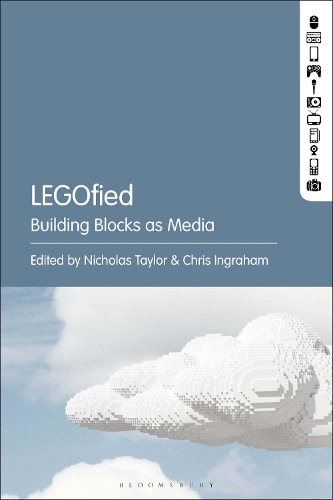
LEGOfied: Building Blocks as Media
(Hardback)
Available Formats
Publishing Details
LEGOfied: Building Blocks as Media
By (Author) Nicholas Taylor
Edited by Chris Ingraham
Bloomsbury Publishing PLC
Bloomsbury Academic USA
20th February 2020
United States
Classifications
Tertiary Education
Non Fiction
Game theory
Graphical and digital media applications
688.725
Physical Properties
Hardback
208
Width 152mm, Height 229mm
435g
Description
LEGOfied: Building Blocks as Media provides a multi-faceted exploration of LEGO fandom, addressing a blindspot in current accounts of LEGO and an emerging area of interest to media scholars: namely, the role of hobbyist enthusiasts and content producers in LEGOs emergence as a ubiquitous transmedia franchise. This book examines a range of LEGO hobbyism and their attendant forms of mediated self-expression and identity (their technicities): artists, aspiring Master Builders, collectors, and entrepreneurs who refashion LEGO bricks into new commodities (sets, tchotchkes, and minifigures). The practices and perspectives that constitute this diverse scene lie at the intersection of multiple transformations in contemporary culture, including the shifting relationships between culture industries and the audiences that form their most ardent consumer base, but also the emerging forms of entrepreneurialism, professionalization, and globalization that characterize the burgeoning DIY movement. What makes this a compelling project for media scholars is its mutli-dimensional articulation of how LEGO functions not just as a toy, cultural icon, or as transmedia franchise, but as a media platform. LEGOfied is centered around their shared experiences, qualitative observations, and semi-structured interviews at a number of LEGO hobbyist conventions. Working outwards from these conventions, each chapter engages additional modes of inquirymedia archaeology, aesthetics, posthumanist philosophy, feminist media studies, and science and technology studiesto explore the origins, permutations and implications of different aspects of the contemporary LEGO fandom scene.
Reviews
A minor revolution in digitally material media studies. Which media are fundamentally clickable, digital, modular, interoperable, highly technical, and infused with both cultural imaginaries and critical realities not previously understood The answer, for Taylor and Ingraham and their five coauthors, is not digital media, at least not conventionally conceived: in this well-conceived and pleasantly cohesive volume, these standout scholars...bring into sharp focus the immersive, even 'palpably pixelated' media environment that is LEGO: the digitally material media worlds of LEGO make us into makers, this volume argues, unearthing in the process a world of conflicted creativity myths, commercial cultures, and legal battles amid its endless minefield for bare feet. * Benjamin Peters, author of How Not to Network a Nation: The Uneasy History of the Soviet Internet (2016) and editor of Digital Keywords: A Vocabulary of Information Society & Culture (2016) *
As Nicholas Taylor and Chris Ingrahams LEGOfied eloquently situates, the social and cultural dimensions of the LEGO phenomenon take on particular characteristics in a playful digital media world. This book will fascinate readers interested in understanding not just LEGO but how it is situated within the logic of playful media more generally. A must for media studies, digital media and game studies researchers. * Larissa Hjorth, Director, Design & Creative Practice, RMIT University, Australia *
Author Bio
Dr. Nicholas Taylor is Associate Professor of Digital Media at North Carolina State University, USA. He applies critical, feminist and posthumanist perspectives to ethnographies of digital play. His work explores the intersections of subjectivity, communicative practice, technologies, and play across a variety of contexts, from competitive gaming tournaments to LEGO conventions. Dr. Chris Ingraham is Assistant Professor of Communication at the University of Utah, USA. He performs scholarship that engages rhetorical theory, media studies, and ecological thought to explore the material and affective aspects of cultural politics in everyday life. His first academic book, Gestures of Concern, is forthcoming with Duke University Press.
